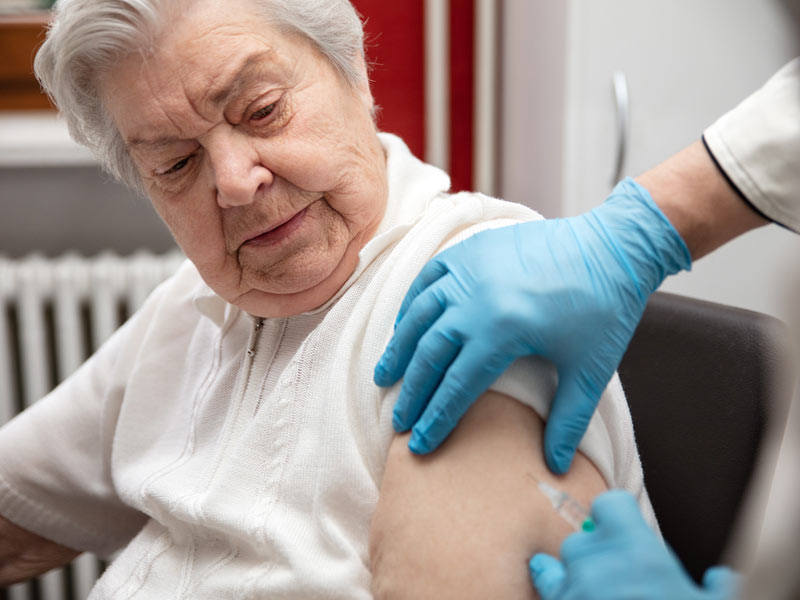CDC Endorses Recommendation for RSV Vaccine for Older Adults
Additional Action on Polio, Influenza and Pneumococcal Vaccines
June 29, 2023, News Staff — The CDC today endorsed recommendations from its Advisory Committee on Immunization Practices for two new vaccines (Abrysvo, manufactured by Pfizer Inc., and Arexvy, manufactured by GSK plc) to prevent respiratory syncytial virus in older adults.

In two separate votes that addressed different age groups, the advisory committee recommended that adults ages 60 and older may receive a single dose of RSV vaccine based on shared clinical decision-making with a health care professional.
AAFP President Tochi Iroku-Malize, M.D., M.P.H., said the Academy “is optimistic that ACIP voted to approve recommendations for new RSV vaccines” and highlighted the crucial role family physicians play in ensuring that people have access to vaccines to prevent infectious diseases.
“We trust the science of vaccines and encourage patients to talk to their family doctors to learn more about the recommendations and vaccines, and how getting vaccinated builds a community of immunity,” Iroku-Malize continued.
“We now have something to offer our older adults to help prevent lower respiratory infections from a very common viral disease,” added Pamela Rockwell, D.O., of Ann Arbor, Mich., the AAFP’s liaison to the ACIP. “With COVID-19, influenza and RSV viruses often circulating at the same time, we can help prevent disease in our older patients by vaccinating against all three.”
The Academy is reviewing the advisory committee’s recommendations and will issue a formal statement soon.
Story Highlights
Lengthy Discussions
The advisory committee approved the recommendation for adults ages 60 to 64 by a 13-0 vote with one abstention, for adults 65 and older by a 9-5 vote.
The votes followed lengthy discussions by committee members about the size of clinical trials, prices and administering RSV vaccines along with seasonal vaccines for influenza and COVID-19. As a result, the original language in the recommendations was amended to “may” from “should.”
Arexvy and Abrysvo, which are both indicated for the prevention of lower respiratory tract disease caused by RSV, received FDA approval in May. The manufacturers intend to have the vaccines available in time for this year’s RSV season.
More on RSV
RSV season typically begins in the fall and peaks during winter. However, evidence suggests that the COVID-19 pandemic changed the seasonal activity of respiratory viruses in 2020 and 2021, and it remains uncertain whether typical patterns will return.
Although most people who develop an RSV infection experience mild illness and recover in less than two weeks, some people — in particular older adults, infants and young children — are at increased risk for severe illness or complications that may require hospitalization.
It should also be noted that the ACIP reviewed data on the use of RSV vaccines in pregnant women to protect infants from RSV during the first six months of life, as well as clinical considerations for the combined use of RSV vaccines and nirsevimab, a monoclonal antibody developed by AstraZeneca and Sanofi to offer broad protection against RSV disease. However, the committee did not vote on these topics. The FDA’s Antimicrobial Drugs Advisory Committee did vote in June to recommend approval of nirsevimab to protect infants from RSV, and a decision from the agency is expected this fall.
Other Actions
Although RSV vaccines drew much of the attention at the ACIP meeting, the committee took other important action, including the unanimous approval of several recommendations pertaining to vaccines for pneumococcal disease:
- the use of either 15-valent or 20-valent pneumococcal conjugate vaccine for all children aged 2-23 months, according to recommended PCV dosing and schedules;
- for young children with incomplete PCV vaccination, the use of PCV15 or PCV20 vaccine, according to recommended PCV dosing and schedules for healthy children aged 24-59 months and children with specified risk conditions aged 24-71 months;
- for children aged 2-18 years with any risk condition who have completed their PCV vaccination series before age 6, no additional doses of any pneumococcal vaccine if they have received one or more dose of PCV20; but one dose of PCV20 or 23-valent pneumococcal polysaccharide vaccine, using previously recommended doses and schedules, if they received PCV13 or PCV15 (but not PCV20); and
- for children aged 6-18 years with any risk indication who have not previously received any dose of PCV 13, PCV15 or PCV20, a single dose of PCV15 or PCV20. When PCV15 is used, it should be followed by a dose of PPSV23 at least eight weeks later if not previously given.
The committee also added moderate persistent or severe asthma, chronic liver disease and chronic kidney disease (excluding maintenance dialysis and nephrotic syndrome) to the list of conditions that put children at increased risk, to be more consistent with the conditions listed for adults.
The ACIP also made the following recommendations:
- Adults aged 18 and older who are known or suspected to be unvaccinated or incompletely vaccinated against polio should complete a primary vaccination series with inactivated polio vaccine.
- Adults who have received a primary series of trivalent oral polio vaccine or inactivated polio vaccine in any combination and who are at increased risk of poliovirus exposure may receive another dose of inactivated polio vaccine. Data do not indicate the need for more than a single lifetime booster dose with inactivated polio virus for adults.
- It is no longer necessary for people with egg allergies to receive an influenza vaccine in a medical setting. Any influenza vaccine appropriate for the recipient’s age and health status can be used regardless of whether it is egg-based.
Finally, the advisory committee reviewed presentations and received updates on vaccines for dengue, chikungunya, Mpox, meningococcal disease and COVID-19, including clinical guidance on the use of the Jynneos vaccine during Mpox outbreaks, and updates on COVID-19 epidemiology and vaccine effectiveness.
“It is clear from data presented that vaccinating persons of all ages against communicable disease helps the entire community with direct and indirect effects,” said Rockwell.